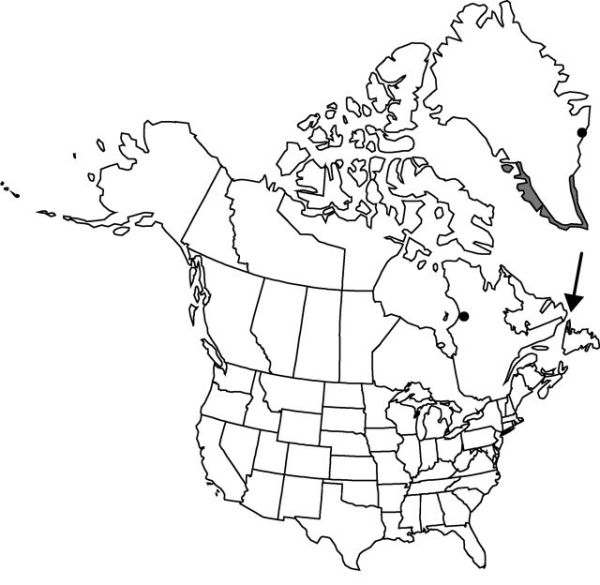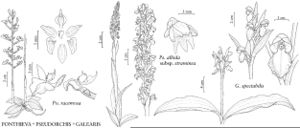Pseudorchis albida subsp. straminea
Taxon 18: 312. 1969.
Plants erect, 5–35 cm. Leaves: blades oblong-obovate to elliptic or lanceolate, 20–90 × 6–40 mm, distal blades narrower. Inflorescences: bracts lanceolate, to 15 × 3 mm, proximal bracts often spreading, conspicuously exceeding flowers. Flowers dull greenish yellow or creamy; perianth nodding, ovaries ascending; dorsal sepal concave, forming hood over column, 2.3–4 × 1–2 mm; lateral sepals wide-spreading, ovate-lanceolate, 3–4 × 1.2–1.8 mm; petals narrowly ovate, 3 × 1.5 mm, associated with dorsal sepal; lip 3-lobed to 1/2 its length, 2–5 × 2–3 mm, lateral lobes lanceolate, slightly falcate, middle lobe oblong, slightly longer than laterals, spur cylindric to clavate, 2–3 mm. Capsules ascending, ellipsoid-obovoid, 6 × 4 mm. 2n = 40, 42.
Phenology: Flowering summer.
Habitat: Wet to rather dry tundra and limestone barrens
Elevation: 0–700 m
Distribution

Greenland, Nfld. and Labr. (Nfld.), Que., n Europe, Atlantic Islands (Faeroe Islands, Iceland).
Discussion
The proper status of the American plants is not clear. Originally described as Habenaria straminea Fernald, the plants of North America, Iceland, and the Faeroe Islands were distinguished by a more yellowish and slightly larger perianth than the common European form. These seemingly minor differences are inconsistent, however, and the plants have generally been treated as only infraspecifically distinct. Because of the occurrence of plants in northern and western Scandinavia, E. Hultén (1958) treated them as Leucorchis albida var. subalpina, and D. M. Moore (1980) treated them as Pseudorchis albida subsp. straminea. Recently, however, L.-G. Reinhammer (1995) presented evidence supporting the recognition of two species. His sample, limited to western Scandinavia and a single Icelandic site, may not be representative of American plants, and our populations should be studied accordingly.
Selected References
None.
